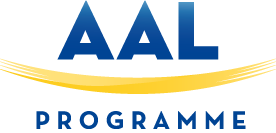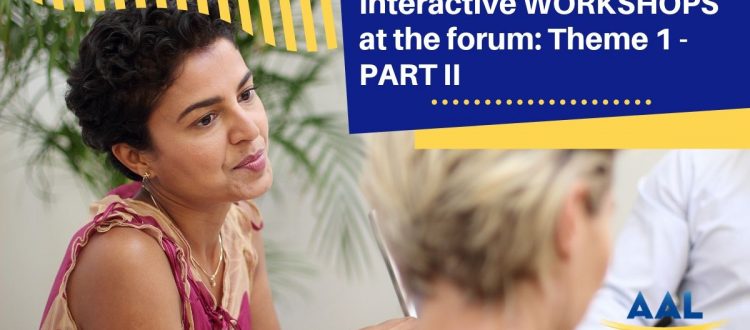Interactive workshops at the forum: Theme 1 (PART 2)
The AAL Forum 2019 is just under two months away, and today we will be giving you another taster of some of the interactive workshops that will be taking place over the course of the event.
As the format of the AAL Forum has evolved over the last decade, its emphasis on interactivity has increased. The workshops that are held each year represent the pinnacle of this focus on sharing knowledge, best practice and experiences, and this year’s selection of sessions promises to be one of the best we’ve ever put together.
Over the coming weeks, we’ll be talking you through the workshops that we have organised for the AAL Forum 2019, which have been grouped together according to theme.
This week we are taking a look at the second half of workshops that address our first theme, “Successful implementation – How do we ensure better, more efficient and long-term implementation?”.
WORKSHOP → Designing a successful AAL implementation roadmap: a design approach to maximise adoption of your AAL solution
📅 Wednesday 25 September
⏲ 9:00-10:30
New AAL concepts are evaluated with users, resulting in solutions that properly address the real needs of older adults. Though this participatory design methodology is valuable in the adoption of solutions and services, and often highlights end user acceptance of these innovations, it is no guarantee for adoption or commercial success
This workshop aims to provide participants with a better understanding of design theory and to provide hands-on experience in how to design a getting-to-market roadmap for their own AAL product or service. This will be approached as a macro-level design challenge. The underlying question being: what can be learnt from design theory in developing the getting-to-market strategy?
WORKSHOP → Digital FrontRunners – qualifications and mindset in the new digital reality
📅 Wednesday 25 September
⏲ 14:00-15:30
Managers, leaders and employees at all levels from the Department of Employment and Social Affairs in the City of Aarhus have met in a cross-pollination project. The aim is to gain new insights and knowledge required in connection with the use and implementation of new technologies and smart solutions.
Digitalisation and introduction of new technologies offer new opportunities – but also new challenges.
The 50 participants in this action-learning “course” engaged in five future-salons and an intermediate assignment – first their own digital Future CV and afterwards a digital Future CV of their team. They have been guided through presentations and reflection exercises to reach a better understanding of the interplay between skillset and mindset required in a modern digital city.
If you want to learn more about the Digital FrontRunners, join this workshop!
WORKSHOP → Early adoption and implementation through collaboration and testing
📅 Wednesday 25 September
⏲ 14:00-14:45
Successful implementation is a give-and-take game which is most effectively resolved through structured collaboration and dialogue. However, both public organisations and private companies are extremely busy. For this reason, we believe collaborations should start in the easiest and cheapest way possible.
Due to no external funding, the Test and Development Centre for Welfare Technology in Viborg, Denmark, bases collaboration on self-interest with the objective of ensuring a pay-off for both the company and public organisation at the first, and possibly last, meeting. Participants in this workshop will learn how the partners behind the Test and Development Centre are working to gather insights into the methods applied, and results of the collaboration will be presented.
Participants can hope to gain knowledge on getting connected to the public sector within health and welfare quick and easy.
WORKSHOP → Selection, testing and implementation of welfare technology in Copenhagen
📅 Wednesday 25 September
⏲ 14:45-15:30
This workshop will enable participants to learn more about the City of Copenhagen’s experiences with selection, testing and implementation of sensors and transfer technologies. You will get new perspectives about involving employees and citizens in the test and development process. We will discuss the difference between technology-driven and need-driven process, and learn more about how we implement technologies at a large scale.
In the Health and Care Administration in Copenhagen we follow different systematic processes when we select, test and implement welfare technologies. Companies present technologies to us, from which we select those that match the needs experienced every day in nursing homes, home care and rehabilitation centres.
From this selection we test welfare technologies in our Living Labs where we have easy access to employees and citizens making it ideal for quick initial tests. Lastly, to implement technology we have developed a systematic approach we use when we implement in a larger scale. We believe the implementation stage must be prioritised if we are to ensure that welfare technology is used by employees and citizens.
WORKSHOP → Evaluating the demand of social technology: A key factor towards market success
📅 Wednesday 25 September
⏲ 14:00-15:30
When talking about ICT-based products for the silver economy, there is a deep lack of alignment between what the market offers and actual user needs, resulting in high-risk or failed business solutions and reduced demand. One of the main causes of this situation resides in the lack of involvement of end users in the product design, development and testing phases.
This workshop will bring measurable results from the Spanish benchmarking initiative, Orientatech, which is an open user-centered platform for technology evaluation where verified analysis of social technology from experts and end user volunteers are published. This is developed by the Social Technologies Foundation in collaboration with the Spanish Red Cross and Vodafone Foundation. Orientatech guides older adults, and other potential users, in deciding what type of product they desire and need whilst allowing them to share their experiences. Digital companies are able to improve the quality, usability and other characteristics of their products thanks to this experts and user feedback.
WORKSHOP →Enabling implementation decisions. Assessing the effectiveness of AAL: the case of EvAALuation and MAFEIP (joint session AAL/EIP on AHA)
📅 Wednesday 25 September
⏲ 16:00-17:30
The decision whether to implement an AAL solution should ideally be based on scientifically validated evidence and proof of the effectiveness of AAL technologies. The complexity of implementation decisions contrasts with the fact that so far only a few AAL-specific instruments for proof of effectiveness exist. Moreover, evaluation results are hardly comparable, since there is often no common understanding of the constructs to be measured.
This results in the need for a mutual understanding regarding impacts for implementation decisions as well as suitable measuring instruments.
EvAALuation² (funded by the Federal Ministry of Transport, Innovation and Technology (BMVIT) within the Austrian Research Promotion Agency (FFG) programme “benefit”) aimed to develop such AAL-specific instruments.
In addition, AAL could benefit from the Monitoring and Assessment Framework for the European Innovation Partnership on Active and Healthy Ageing” (MAFEIP) supported by the EC.
MAFEIP is a web-based tool whose purpose is to estimate the health and economic outcomes of a large variety of ICT enabled social and health innovations, supporting evidence-based decision-making processes for all institutions and users in the health and care sector.
This workshop will provide an overview of important impact dimensions of AAL solutions relevant for implementation decisions. To enable evidence-based decisions, practices, challenges, and lessons learned of impact measurements will be discussed, including the usage of cost.

